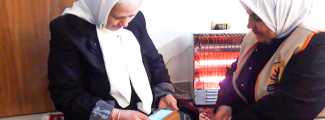The heroine of the story, Mrs. Wafa, from the Damascus neighborhood of Amara, married and gave birth to a much-awaited-for girl with love and tenderness. Unfortunately, she was struck by a postpartum fever and was treated with folk medicine, which worsened her condition. The fever severely affected the memory center in the brain and, as a result, she suffered an early Alzheimer’s.
The woman currently lives with her niece’s family, who looks after her with much love and affection. Recently, however, her psychological condition worsened. She was no longer willing to take the medicine, throwing it under the bed, which obviously led to an exasperating situation. So, she was in constant conflict with her niece’s younger son, which caused much trouble to the family who soon reached a dead end.
On our first visit, the impression of her was both lovely and sad. The unfortunate woman met us with affection, kindness and a beautiful smile on her face. At the same time, she seemed to have signs of sadness and weakness in her eyes. She confided to us that she had a daughter married abroad with whom she rarely communicated. There and then, the caregiver told us Mrs. Wafa’s story. In brief—
“After the mother’s illness, her husband took the baby girl off and prevented Wafa from visiting her daughter, which made her feel always sad and miserable.”
We also noticed the disagreement between Wafa and the family’s youngest son. Work with the family involved the caregiver’s participation in all activities and exercises, which included teaching the niece appropriate ways of dealing with her aunt, and also the proper way to administer her medicines. “She now takes her medicine regularly, without any problem whatsoever,” said the niece at the end of follow-up visits.
In the beginning, we contacted the attending physician through the caregiver to develop an intervention plan that suits Wafa and meets her medical and psychological needs. The first step was to download memory games on her smartphone, especially that she was so attached to it, and help her solve them to strengthen her memory. She shared with the family’s youngest boy certain games and exercises too difficult for her to solve and, in the process, a close relationship developed between the elderly woman and the little boy.
This was followed by intervention through Rubik’s Cube, crossword exercises, and jigsaw puzzles. In the beginning, the activity took a lot of time, which, soon enough, began to gradually decrease. A smile shone on Wafa’s face each time a Rubik step was completed. Visits followed, after which Wafa started to participate in some household chores, such as pealing and cutting vegetables and fruits, making coffee, etc. Despite the fact that she had not indulged in housework for years, she accomplished these tasks with great happiness and joy. Wafa always repeats this sentence to the volunteer as a song refrain: “Don’t be too long to come and see me.”
The visits and sessions contributed to creating an ambiance of interaction and fun in the life of Wafa. Her relationship with members of her family has become more interactive. Similarly, her social relations improved, as she now enjoys exchanging visits with neighbors, which was observed during the last visit. All this helped Wafa get back into a normal life.

